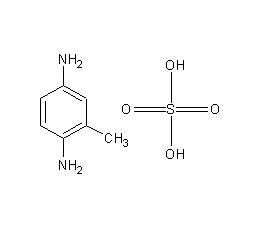2,5-Diaminotoluene sulfate


Structural formula
| Business number | 06GC |
|---|---|
| Molecular formula | C7H10N2·H2SO4 |
| Molecular weight | 220.25 |
| label |
o-Methyl p-phenylenediamine sulfate, Toluenediamine sulfate, Toluene-2,5-diamine sulfate, Sulfate-2,5-diaminotoluene, 2-Methyl-1,4-phenylenediamine sulfate, p-Toluenediamine sulfate, Dimethyl-1,4-phenylenediamine sulfate, 2,5-Toluenediamine sulfate, 2-Methyl-p-phenylenediamine sulfate salt, CH3C6H3(NH2)2·H2SO4 |
Numbering system
CAS number:615-50-9
MDL number:MFCD00013003
EINECS number:210-431-8
RTECS number:XT0525000
BRN number:3755478
PubChem number:24849428
Physical property data
Physical property data: 1. Properties: This product is light red powder
2. Melting point (℃): 300
Toxicological data
Acute toxicity:
Oral LD50 98mg/kg (rat)
Main irritant effects:
On the skin: Irritation to skin and mucous membranes.
On eyes: Irritation effects
Sensitization: May cause sensitization through skin contact.
Ecological data
3. Ecological data:
General notes
Water hazard level 3 (German regulations) (self-assessment through the list) This substance is extremely harmful to water.
Do not allow this product to come into contact with groundwater, waterways or sewage systems, even in small amounts.
Even extremely small amounts of the product seeping into the ground can be dangerous to drinking water
It is also toxic to fish and plankton in the water.
Do not discharge materials into the surrounding environment without government permission.
Highly toxic to organic matter in water.
Molecular structure data
5. Molecular property data:
1. Molar refractive index: 39.55
2. Molar volume (cm3/mol): 110.2
3. Isotonic specific volume (90.2K): 296.5
4. Surface tension (dyne/cm): 52.3
5. Polarizability (10-24cm3): 15.67
Compute chemical data
1. Reference value for hydrophobic parameter calculation (XlogP): None
2. Number of hydrogen bond donors: 4
3. Number of hydrogen bond acceptors: 6
4. Number of rotatable chemical bonds: 0
5. Number of tautomers: none
6. Topological molecule polar surface area 135
7. Number of heavy atoms: 14
8. Surface charge: 0
9. Complexity: 174
10. IsopositionNumber of prime atoms: 0
11. Determine the number of atomic stereocenters: 0
12. Uncertain number of atomic stereocenters: 0
13. Determine Number of stereocenters of chemical bonds: 0
14. Number of stereocenters of uncertain chemical bonds: 0
15. Number of covalent bond units: 2
Properties and stability
1. Basic properties
Irritant to eyes, respiratory system and skin.
Storage method
2. Storage
Should be kept sealed in a cool and dark place.
Synthesis method
None yet
Purpose
3. Use
Used as an artificial electron donor in the study of photosensitive system I.
